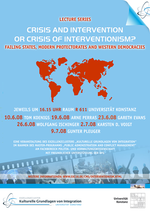Crisis and Intervention or Crisis of Interventionism?
Failing States, Modern Protectorates and Western Democracies
Lecture Series of the M.A.-Program "Public Administration and Conflict Management"
Background
In 1994, the genocide in Rwanda claimed the lives of between 800,000 and 1 million people. In 1995, Serbian and Bosnian Serb troops murdered about 8,000 Muslim boys and men. Both cases happened in front of the eyes of United Nations peacekeepers, who either did not dare to intervene or had been expressly forbidden from doing so.
As a result of these experiences, the United Nations introduced the principle, based on the General Declaration of Human Rights, of the Responsibility to Protect (R2P) at the UN international summit in 2005. This underlines the responsibility of every state to protect its citizens from genocide, ethnic cleansing, war crimes and crimes against humanity. The principle of Responsibility to Protect, however, also refers to the responsibility of the international community to intervene when states are unwilling or unable to protect their citizens.
In practice, however, international intervention remains controversial. The necessary UN mandates are often blocked by permanent members of the UN’s Security Council. One example of this can be seen in the inability of the United Nations to take decisive steps to end the violence and mass killing in the Sudanese province of Darfur. Here, according to UN estimates, around 300,000 people have died, while a further 2 million have been displaced by violence and now live in refugee camps in Sudan or neighbouring Chad. Following the catastrophic floods in Burma, the same question was raised again: should one have intervened against the will of the country’s military regime in order to save human lives?
The criticism of international intervention begins with quite fundamental questions: for example, does intervention only serve the pursuit of economic interests? Is it an expression of neo-colonialism? Are the principles of the United Nations – respect for human rights and respect for state sovereignty – fundamentally contradictory? Can the United Nations really keep its promise to protect? Would an alliance of democratic states provide better protection of human rights? Did the European Union not do this when it intervened in Congo and Chad, and is it not doing this now that it is taking over the administration of Kosovo from the United Nations?
These questions will be discussed in the series of lectures organised by the Center of Excellence “The Cultural Foundations of Integration” in collaboration with the Department of Politics and Management at the University of Konstanz.
Lectures
10 June Tom Koenigs
19 June Arne Perras: Grenzerfahrungen im Kriegsgebiet - Beobachtungen eines Korrespondenten
omitted! 23 June Gareth Evans
26 June Wolfgang Ischinger: International Crisis Management and Intervention: Some Preliminary Conclusions (German)
2 July Karsten D. Voigt: Bestandsaufnahme zu den deutsch-amerikanischen Beziehungen am Ende der Ära Bush
14 July (new date!) Gunter Pleuger: Politische und völkerrechtliche Probleme multilateraler Krisenbewältigung
Lectures start at 16.15 h.
University of Konstanz, lecture hall R 611
Contact
Dr. Sven Sappelt
Tel. +49 7531 88-4763
E-Mail sven.sappelt[at]uni-konstanz.de

